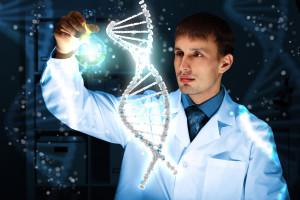-
Heredity – Are you doomed to a life with varicose veins?
Posted on October 15, 2015 by Vein Admin in dr joseph magnant, spider veins, varicose vein facts, varicose veinsAs we age we being to wonder what we will grow to look like and how our health will hold up as time goes by. Our older relatives are often the best gage by which to measure ourselves. Our parents being the closest genetic link we often strongly resemble either one or the other or sometimes even both. So, what does it mean for you if your mother or father has varicose veins in their legs? Does that mean varicose veins are in your future?
The conclusion of the majority of epidemiological research has established a trend pointing towards clusters of people within a genetic family which have presented symptoms of varicose veins during their lifetimes. When DNA profiles were analyzed the commonality present in those who end up with varicose veins seems to be an inherited genetic mutation known as the Fox C2 Gene mutation.
The Fox C2 Gene mutation is also known as the forkhead box C2 winged helix. There are 50 known Fox genes within the human genome currently and possibly more to be discovered. The double helix is critical for the formation, durability and strength of the vein walls and valves. In people with the Fox C2 mutation the RN’ase instruction set is incorrect or incomplete causing weakness. Over time this weaker version of the adaptation will begin to break down, fail and deteriorate. Symptoms can often include: swelling, pain, heaviness and discoloration of the veins themselves leading to varicose or spider veins. So far there is no correction for this genetically. Medical treatment is very likely to be required once symptoms begin to present themselves.
How do you know if you have a Fox C2 gene mutation?
If a parent has varicose veins, it is only an indicator of the possibility. The only way to know for sure is to have your DNA analyzed. The Fox C2 gene is an autosomal dominant gene (not a recessive gene) which means that both male and female offspring may carry it. It is also quite possible, even likely, that it can lie dormant and not present itself, seemingly skipping a generation.
What if a DNA test comes back with a positive Fox C2 mutation?
If that occurs, lifestyle choices become even more important. There are things you can do proactively to help prevent vein issues.
- Exercise and stay fit (low impact activities like swimming or yoga and stretching are recommended).
- Opt for flat shoes over heels.
- Consider wearing support hose.
- Sit with legs straight or crossed at the ankle. Avoid leg crossing at the knee.
- At the end of the day, sit with your feet propped up higher than your head for 10-15 minutes allowing the blood to recirculate.
- Drink plenty of water and stay hydrated.
While genetics play an important role in whether or not you will develop venous issues during your lifetime, your lifestyle and health choices can either support or hinder your vein health. Just because mom or dad had to deal with this issue doesn’t necessarily mean that you will.
If you have further questions or are experiencing symptoms that you would like to have addressed, we invite you to give us a call today at (239) 694-VEIN and Let Dr. Joseph Magnant, M.D. experienced Fort Myers and Bonita Springs Vein Specialist help. With offices at two convenient locations – 1510 Royal Palm Square Blvd. Suite 101 Fort Myers, Florida 33919 or 3359 Woods Edge Circle Suite 102 Bonita Springs, Florida 34134. For your convenience you can also visit our website www.eveinscreening.com to set up a Virtual FREE Vein Consultation.
Sources:
http://www.optimaveincare.com/blog/genetic-varicose-veins/
http://www.ncbi.nlm.nih.gov/pmc/articles/PMC2444750/pdf/brmedj07145-0012.pdf
http://circgenetics.ahajournals.org/content/5/4/460.full
http://ang.sagepub.com/content/41/3/228.short
http://circgenetics.ahajournals.org/content/5/4/460.full






